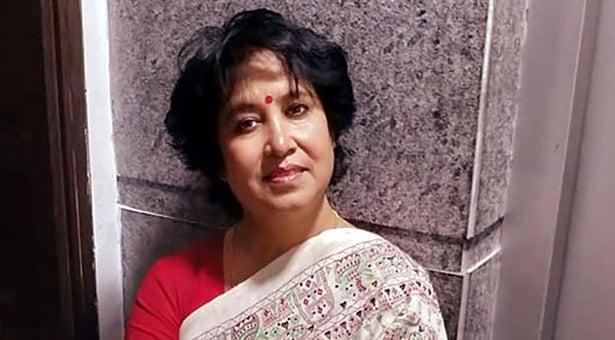| Literary works | - At college in Mymensingh, Nasrin published and edited a literary magazine, Senjuti ('Light in the dark'), from 1978 to 1983.
- She published her first collection of poems in 1986.
- Her second collection, Nirbashito Bahire Ontore ('Banished within and without'), was published in 1989.
- She succeeded in attracting a wider readership when she started writing columns in the late 1980s and in the early 1990s.
- She cites that Virginia Woolf, Simone de Beauvoir, Begum Rokeya, who lived during the time of undivided Bengal, were Taslima's inspirations to be an author.
- In all, she has written more than thirty books of poetry, essays, novels, short stories, and memoirs, and her books have been translated into 20 different languages.
|
|---|
| Columns and essays | - In 1989, Nasrin began to contribute to the weekly political magazine Khaborer Kagoj, edited by Nayeemul Islam Khan, and published from Dhaka.
- She wrote columns in a volume titled Nirbachita Column, which, in 1992, won her first Ananda Purashkar award, a prestigious award for Bengali writers.
- Later, she contributed a weekly essay to the Bengali version of The Statesman, called Dainik Statesman.
- Taslima has always advocated for an Indian Uniform civil code during her contribution as a social activist and said that criticism of Islam is the only way to establish secularism in Islamic countries.
- Taslima said that Triple talaq is despicable and the All India Muslim Personal Law Board should be abolished in her writings.
- Taslima has also written articles for online media venture 'The Print in India.'
|
|---|
| Novels | - Taslima's breakthrough novel Lajja ('Shame') was published in 1993 (In six months' time, it sold 50,000 copies in Bangladesh before being banned by the government in the same year, and it attracted wide attention because of its controversial subject matter)
- Her other famous novel is French Lover, published in 2002.
|
|---|
| Autobiography(s) | - Amar Meyebela (My Girlhood, 2002), the first volume of her memoir, was banned by the Bangladeshi government in 1999 for 'reckless comments' against Islam and the prophet Mohammad.
- Utal Hawa (Wild Wind), the second part of her memoir, was banned by the Bangladesh government in 2002.
- Ka (Speak up), the third part of her memoir, was banned by the Bangladeshi High Court in 2003.
- The book Dwikhandita was published in West Bengal.
- Sei Sob Ondhokar (Those Dark Days), the fourth part of her memoir, was banned by the Bangladesh government in 2004.
- A total of seven parts of her autobiography have been published. 'Ami bhalo nei tumi bhalo theko priyo desh', 'Nei kichu nei' and 'Nirbashito.'
- She received her second Ananda Purashkar award in 2000 for her memoir Amar Meyebela (My Girlhood, published in English in 2002).
|
|---|
| Poetry(s) | - Shikore Bipul Khudha (Hunger in the Roots), 1982
- Nirbashito Bahire Ontore (Banished Without and Within), 1989
- Amar Kichu Jay Ashe Ne (I Couldn’t Care Less), 1990
- Atole Ontorin (Captive in the Abyss), 1991
- Balikar Gollachut (Game of the Girls), 1992
- Behula Eka Bhashiyechilo Bhela (Behula Floated the Raft Alone), 1993
- Ay Kosto Jhepe, Jibon Debo Mepe (Pain Come Roaring Down, I’ll Measure Out My Life for You), 1996
- Nirbashito Narir Kobita (Poems From Exile), 1996
- Jolpodyo (Waterlilies), 2000
- Khali Khali Lage (Feeling Empty), 2004
- Kicchukhan Thako (Stay for a While), 2005
- Bhalobaso? Cchai baso (It’s your love! or a heap of trash!), 2007
- Bondini (Prisoner), 2008
- Golpo(stories), 2018
|
|---|
| Nasrin's works in adaptation | - In 1994, the Swedish singer Magoria sang 'Goddess in you, Taslima.'
- In 2003, the French band Zebda composed 'Don't worry, Taslima' as a homage to her.
- Jhumur was a 2006 TV serial, the story of which was written by Taslima.
- Bengali singers like Fakir Alamgir, Samina Nabi, Rakhi Sen sang her songs to support her motive.
- Steve Lacy, the jazz soprano saxophonist, met Nasrin and collaborated with her on an adaptation of her poetry to music and a 'controversial' and 'compelling' work called The Cry, was performed in Europe and North America in 1988.
|
|---|





